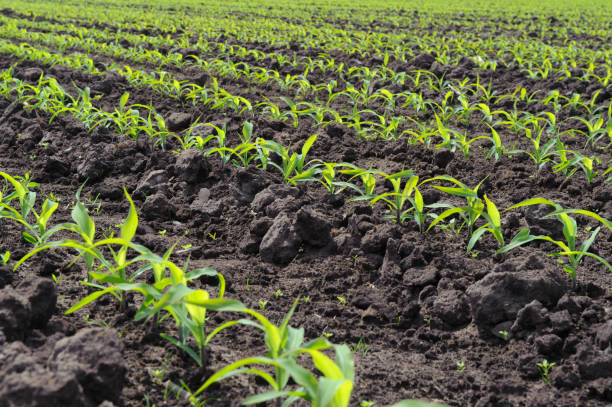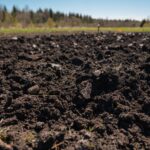Potassium humate, also known as humic acid potassium, is a natural organic compound derived from humic substances found in sources like leonardite, lignite, or peat. It is widely used in organic and conventional agriculture as a soil conditioner, fertilizer enhancer, and plant growth stimulant. Its benefits stem from its ability to improve soil health, enhance nutrient availability, promote plant growth, and support sustainable farming practices.
Comprehensive Benefits of Potassium Humate
Potassium humate offers a wide range of benefits for agriculture, environmental management, and related applications. Its primary advantages lie in its ability to improve soil conditions, optimize nutrient use, and enhance plant resilience, making it a valuable tool for farmers, especially in organic systems.
1. Soil Health Improvement
Potassium humate significantly enhances soil quality, which is critical for sustainable agriculture, particularly in organic farming where synthetic inputs are limited.
- Improved Soil Structure: Potassium humate helps create a loose, crumbly soil structure by binding soil particles into aggregates. This reduces soil compaction, improves aeration, and enhances water infiltration, making it easier for roots to grow and access nutrients. For example, in heavy clay soils, it reduces stickiness, while in sandy soils, it improves cohesion.
- Increased Water Retention: By enhancing the soil’s ability to hold water, potassium humate ensures that moisture is available to plants during dry periods. This is especially beneficial in drought-prone areas or for organic farmers relying on natural water sources.
- Higher Cation Exchange Capacity (CEC): Potassium humate increases the soil’s CEC, which is its ability to hold and exchange nutrients like potassium, calcium, and magnesium. This means nutrients from fertilizers stay in the soil longer, reducing waste and supporting plant growth.
- Boosted Soil Microbial Activity: It stimulates beneficial soil microbes, such as nitrogen-fixing bacteria and mycorrhizal fungi, which break down organic matter and release nutrients. This creates a thriving soil ecosystem, essential for organic farming where microbial activity is a key source of fertility.
2. Enhanced Nutrient Availability and Fertilizer Efficiency
Potassium humate acts as a natural enhancer for fertilizers, making nutrients more accessible to plants and reducing losses.
- Nutrient Chelation: It binds essential nutrients (e.g., nitrogen, phosphorus, potassium, iron, zinc, magnesium) in a form that plants can easily absorb. This prevents nutrients from being locked up in the soil or washed away by rain or irrigation, a common issue in sandy or low-organic-matter soils.
- Reduced Nutrient Loss: By holding nutrients in the soil, potassium humate minimizes leaching (where nutrients wash away) and volatilization (where nutrients like nitrogen are lost to the air). This is particularly valuable for organic fertilizers, such as compost or manure, which can lose nutrients quickly without proper management.
- Improved Micronutrient Uptake: Potassium humate makes micronutrients like iron, zinc, and manganese more available to plants, addressing deficiencies that can limit growth, especially in organic systems where synthetic micronutrient supplements are not allowed.
- Fertilizer Efficiency: When mixed with organic or chemical fertilizers, potassium humate enhances their effectiveness, allowing farmers to use less fertilizer while achieving the same or better results. This reduces input costs and environmental impact, aligning with organic farming’s sustainability goals.
3. Promotion of Plant Growth and Resilience
Potassium humate directly supports plant development, leading to healthier crops and higher yields.
- Stronger Root Systems: It stimulates root growth, increasing root length and density. This allows plants to access more water and nutrients, improving overall health and productivity. For example, organic vegetable crops like tomatoes or carrots benefit from stronger roots, leading to larger, healthier yields.
- Faster Seed Germination: When applied as a seed treatment, potassium humate speeds up germination and promotes early seedling vigor, giving crops a head start, which is critical for organic farmers competing with weeds or pests without synthetic controls.
- Enhanced Photosynthesis and Metabolism: It boosts plant processes like photosynthesis and enzyme activity, leading to faster growth, greener leaves, and better fruit or seed development.
- Stress Resistance: Potassium humate helps plants withstand environmental challenges, such as drought, high salinity, or extreme temperatures, by improving water retention, strengthening cell walls, and enhancing metabolic resilience. This is especially important in organic farming, where synthetic stress-relief products are not used.
4. Increased Crop Yields and Quality
By improving soil conditions and nutrient uptake, potassium humate leads to better crop performance.
- Higher Yields: Enhanced nutrient availability and root growth result in larger harvests. For example, studies have shown yield increases of 10–25% in crops like wheat, tomatoes, or strawberries when potassium humate is used with organic fertilizers.
- Improved Crop Quality: It enhances the nutritional content, flavor, color, and shelf life of fruits, vegetables, and grains. Organic farmers benefit from producing high-quality produce that meets consumer demand for tastier, longer-lasting organic products.
- Consistent Growth: Potassium humate supports uniform plant development, reducing variability in crop size or quality, which is valuable for commercial organic farms aiming for reliable market supply.
5. Environmental Sustainability
Potassium humate supports eco-friendly farming practices, making it a cornerstone of sustainable agriculture.
- Reduced Nutrient Runoff: By binding nutrients in the soil, it prevents excess nitrogen or phosphorus from washing into rivers, lakes, or groundwater, reducing pollution and protecting aquatic ecosystems. This is critical for organic farming’s environmental ethos.
- Soil Remediation: Potassium humate binds heavy metals (e.g., lead, cadmium) in contaminated soils, reducing their toxicity and aiding in land restoration. This is useful for organic farmers reclaiming degraded or previously conventional farmland.
- Carbon Sequestration: By increasing soil organic matter, it helps store carbon in the soil, contributing to efforts to combat climate change—a growing priority in organic agriculture.
- Lower Input Dependency: By improving fertilizer efficiency, potassium humate reduces the need for frequent or heavy fertilizer applications, lowering environmental impact and input costs.
6. Versatility and Compatibility
Potassium humate is highly adaptable, making it easy to integrate into various farming systems.
- Compatible with Organic Inputs: It works well with organic fertilizers like compost, manure, fish emulsion, or seaweed extract, enhancing their performance without compromising organic certification.
- Multiple Application Methods: Available as powder, granules, or liquid, it can be applied to soil, sprayed on leaves, used in irrigation systems, or coated on seeds, offering flexibility for different crops and farming practices.
- Broad Crop Suitability: Effective for a wide range of crops, including organic vegetables (e.g., tomatoes, lettuce), fruits (e.g., apples, strawberries), grains (e.g., wheat, rice), and ornamentals, making it a versatile tool for diverse organic farms.
7. Cost-Effectiveness
While high-quality potassium humate may have a higher upfront cost than some synthetic fertilizers, its long-term benefits make it economical.
- Reduced Fertilizer Use: By improving nutrient efficiency, farmers can apply less fertilizer, saving money on inputs while maintaining or increasing yields.
- Long-Term Soil Benefits: Improved soil health reduces the need for frequent soil amendments, lowering costs over time.
- Higher Market Value: For organic farmers, the improved quality and yield of crops can command higher prices in markets that value organic, sustainable produce.
8. Support for Organic Certification
Potassium humate is a natural product that meets strict organic certification standards (e.g., USDA NOP, EU organic regulations) when sourced and processed correctly. This ensures it is safe for use in certified organic farming, building trust with consumers and supporting the organic movement’s goals.
Specific Benefits in Organic Fertilizers
In the context of organic fertilizers, potassium humate amplifies the effectiveness of natural inputs, addressing common challenges in organic farming:
- Maximizing Limited Inputs: Organic fertilizers like compost or manure can lose nutrients quickly through leaching or volatilization. Potassium humate binds these nutrients, ensuring they stay available to plants, which is critical when synthetic fertilizers are not an option.
- Addressing Nutrient Deficiencies: Organic systems often struggle with micronutrient availability (e.g., iron, zinc). Potassium humate enhances the uptake of these nutrients, reducing deficiencies and improving crop health.
- Supporting Slow-Release Nutrition: It helps organic fertilizers release nutrients gradually, providing a steady supply to crops throughout the growing season, unlike some organic inputs that release nutrients too quickly.
- Enhancing Compost and Manure: When mixed with compost or manure, potassium humate improves their nutrient content and stimulates microbial activity, making these inputs more effective.
Real-World Examples
- Organic Vegetables: In California, organic tomato farmers using liquid potassium humate in drip irrigation have reported 15–20% higher yields, with larger, tastier fruits due to improved nutrient uptake and soil moisture retention.
- Organic Orchards: Organic apple growers in Washington apply granular potassium humate around tree bases, enhancing soil health and helping trees withstand drought, resulting in more consistent fruit production.
- Organic Grains: Organic wheat farmers in the Midwest mix potassium humate with compost, improving yields in sandy soils by 10–15% through better nutrient retention and root growth.
- Organic Greenhouses: Greenhouse growers of organic lettuce or herbs use foliar sprays of potassium humate, boosting leaf color and growth rates, leading to faster harvests and higher-quality produce.
Practical Considerations for Maximizing Benefits
To fully realize the benefits of potassium humate, farmers should consider the following:
- Soil Testing: Test soil for pH, nutrient levels, and organic matter to determine the appropriate application rate. Potassium humate is most effective in slightly acidic to neutral soils (pH 5.5–7.5), though its fulvic acid component works in more acidic conditions.
- Correct Dosage: Follow product guidelines, typically 5–50 kg per hectare for soil applications, 1–5 g per liter for foliar sprays, or 1–10 liters per hectare for fertigation. Overuse can lead to nutrient imbalances, while underuse may limit benefits.
- Compatibility: Ensure potassium humate mixes well with organic fertilizers (e.g., compost, seaweed) to avoid clumping or reduced effectiveness. Test small batches when combining with new products.
- Timing: Apply during key growth stages, such as planting, vegetative growth, or flowering, to maximize nutrient uptake and plant response. For example, apply to organic fruit trees in early spring to support bud development.
- Storage: Store powder or granules in a dry, cool place to prevent clumping, and keep liquid forms away from extreme temperatures to maintain quality.
- Quality Selection: Choose high-quality, organic-certified potassium humate from reputable sources, preferably leonardite-based, to ensure maximum effectiveness and compliance with organic standards.
Safety and Environmental Considerations
Potassium humate is non-toxic and environmentally safe, aligning with organic farming’s natural approach. Basic handling precautions include:
- Spill Management: Sweep up spilled powder or granules and store in a container for reuse or proper disposal, avoiding contamination of water sources.
- Protective Measures: Wear gloves and a mask when handling powder to avoid minor irritation from dust, though health risks are minimal.
- Disposal: Follow organic certification rules and local regulations for disposing of unused product, ensuring no environmental harm.
Challenges to Benefits
While potassium humate offers significant advantages, some challenges should be noted:
- Product Quality: The effectiveness depends on the source (e.g., leonardite vs. peat) and processing. Organic-certified, leonardite-based products are typically the most effective.
- Soil Variability: Benefits vary by soil type. In highly alkaline soils (pH > 8), pH adjustment may be limited, while in very acidic soils, humic acid solubility may decrease, though fulvic acid remains effective.
- Initial Cost: High-quality potassium humate can be more expensive than some synthetic fertilizers, but its long-term benefits, like reduced fertilizer use and higher yields, often outweigh costs.
- Farmer Education: Some farmers may need guidance on proper application methods to maximize benefits. Support from organic farming advisors can help.
Future Potential
As global demand for sustainable and organic agriculture grows, potassium humate is poised to play a larger role. Its ability to enhance soil health, reduce environmental impact, and improve crop productivity aligns with goals for climate-smart farming. Advances in precision agriculture, such as sensor-guided fertigation or drone-based foliar sprays, will likely make its application more efficient. Additionally, its role in carbon sequestration supports efforts to mitigate climate change, making it a key tool for future organic farming systems.
Conclusion
Potassium humate is a powerful, natural tool that offers numerous benefits for organic agriculture, particularly when used in organic fertilizers. By improving soil structure, enhancing nutrient availability, promoting plant growth, and supporting environmental sustainability, it helps organic farmers achieve higher yields, better crop quality, and healthier soils without synthetic inputs. Its versatility, compatibility with organic inputs, and compliance with organic standards make it an essential component of sustainable farming. To maximize its benefits, farmers should use high-quality, organic-certified products, apply them correctly based on soil and crop needs, and seek guidance from local experts if needed. As organic farming continues to expand, potassium humate will remain a vital asset for productive, eco-friendly agriculture.









